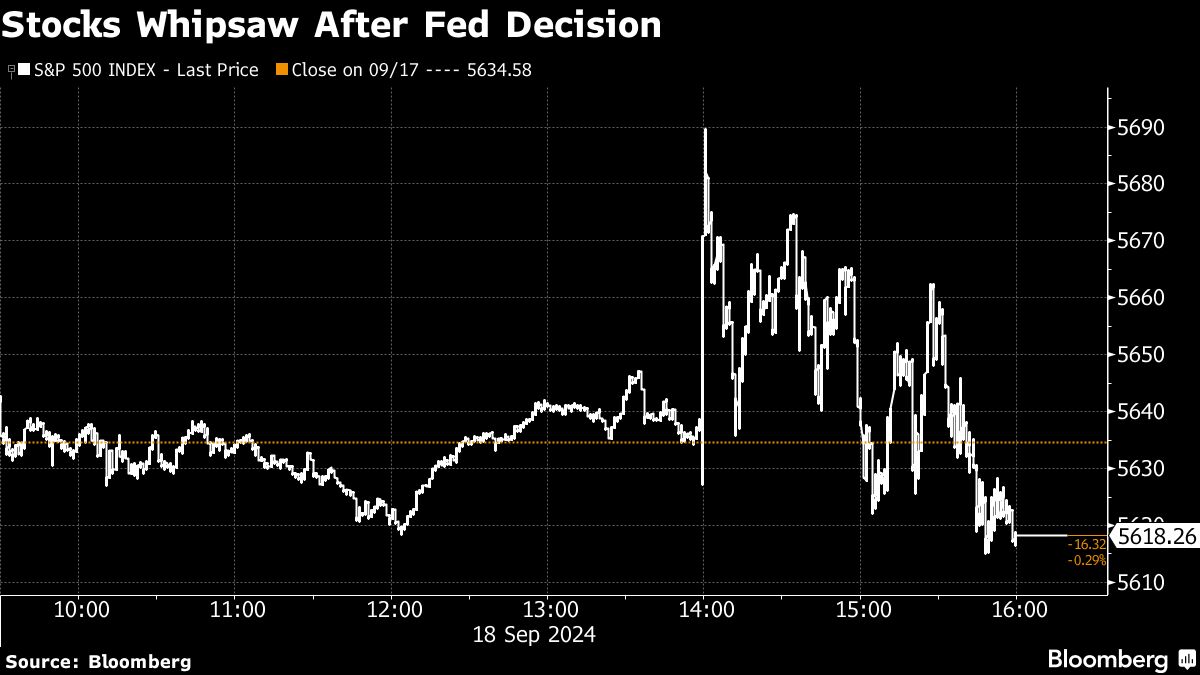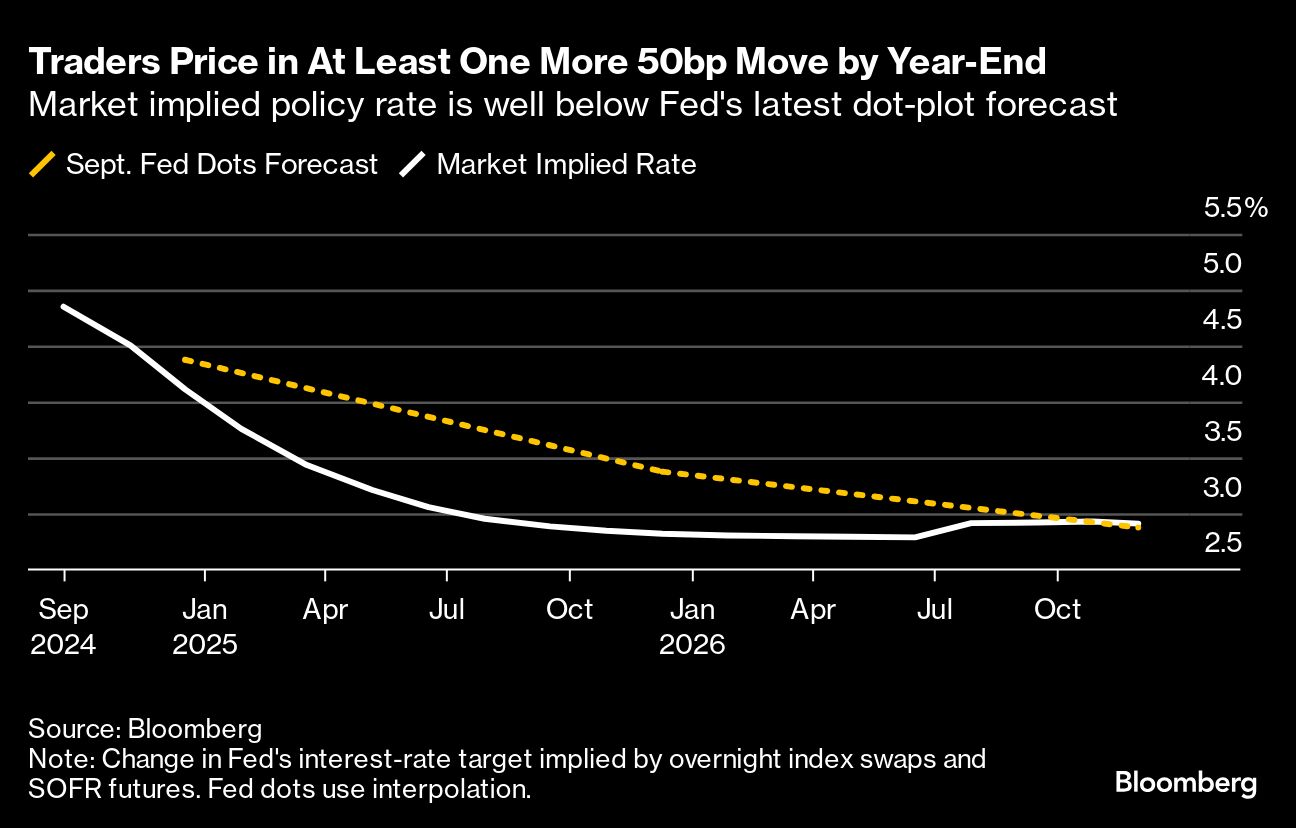.jpg?downsize=773:435)
(Bloomberg) -- A rally that briefly drove stocks to their all-time highs bumped into a wall as the Federal Reserve signaled it's not in a rush to ease policy after cutting rates by a half-point.
The S&P 500 wiped out a gain of 1% as Jerome Powell cautioned against assuming big rate cuts would continue. While that's not necessarily bad given that aggressive easing is usually associated with economic stress, traders ended up pushing equities near session lows at the 4 p.m. New York close.
“After a rally ahead of today's Fed announcement, it wouldn't be unreasonable for the market to pull back a bit,” said Bret Kenwell at eToro. “However, the long-term outlook remains promising. So long as the economy holds up and inflation doesn't roar back to life, lower rates and strong earnings growth can continue to drive stocks higher over the long term.”
To Ian Lyngen and Vail Hartman at BMO Capital Markets, Powell's press conference was consistent with the magnitude of the cut and effectively communicated that officials aren't particularly worried about any aspect of the real economy at the moment.
“It's impressive that in the classic, ‘buy-the-rumor, sell-the-fact' dynamic, the ‘fact' of a 50 basis-point cut was still met by selling,” they said, referring to the reversal in bonds. “Positions are being squared and the market is moving back into the mode of trading the incoming economic data with an eye to the potential influence from the presidential race.”
The S&P 500 fell 0.3%. The Nasdaq 100 dropped 0.5%. The Dow Jones Industrial Average lost 0.2%. A gauge of the “Magnificent Seven” megacaps slid 0.1%. The Russell 2000 of small firms was little changed.
Treasury 10-year yields advanced six basis points to 3.7%. The dollar rose.

Markets may temporarily encounter the “buy the rumor, sell the news” phenomenon, according to Florian Ielpo at Lombard Odier Investment Managers. That said, traders will need to remember how the Fed has transitioned from being a headwind to a tailwind, he added.
“While most of its potential actions may have been priced in by the bond market, the benefits of easing are difficult to gauge, and the equity (and credit) market could very well underestimate them,” Ielpo said. “The benefits of these cuts will depend heavily on the growth scenario: rising equities if there is no recession, but declining if growth fails to meet expectations.”
To Chris Larkin at E*Trade from Morgan Stanley, the markets got what they wanted — a big first cut by the Fed.
“The Fed has a well-deserved reputation for not rushing, so there's the potential for some disappointment if it's seen to be moving too slowly, especially if economic data continues to soften. But today they delivered,” he added.
The market is now pricing in another 70 basis points worth of rate reductions at the Fed's two remaining meetings this year, reflecting a far more aggressive stance than policymakers. Officials on Wednesday forecast just a half-point of further easing in 2024. They penciled in an additional percentage point of cuts in 2025, according to the median forecast.
“Powell made it clear that today's decision was not a crisis rate cut but instead a normalization of monetary policy from a very restrictive level,” said Kristina Hooper at Invesco. “I anticipate risk assets could perform well in the coming weeks given the Fed's reassurances – unless future economic data suggests greater weakening.”

Jamie Cox at Harris Financial Group says he's still skeptical of the extent of expected rate cuts next year given that more aggressive reductions are associated with crises.
“We look for traditional beneficiaries including small caps, value, cyclical sectors, and the equally-weighted S&P 500 Index to experience tailwinds,” he noted.
To Krishna Guha at Evercore, the big move out the gates takes out some insurance on the soft landing, and should particularly benefit risky assets geared into the cycle, such as small caps, cyclicals, commodities and commodity currencies.
“Despite the skepticism around the economic need for an aggressive 50 basis-point cut, markets can and should only celebrate today's move - and will continue to celebrate over coming months,” said Seema Shah at Principal Asset Management. “We have a Fed that will go to historic lengths to avoid a hard landing. Recession, what recession?”
“The Fed is cutting in celebration of controlled inflation, not in desperation,” she said. “Don't give up on the stock market. We think there's still a chance the Fed saves the job market – and consequently, the economy – with lower rates. And if that happens, the biggest – and most expensive – risk here is to miss an eventual rally led by the unlovable parts of the market.”
Essential Business Intelligence, Continuous LIVE TV, Sharp Market Insights, Practical Personal Finance Advice and Latest Stories — On NDTV Profit.























